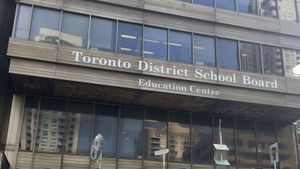With the German Federal Election rapidly approaching on February 23, 2025, political candidates are facing pressing questions about the economy, migration, and contentious issues like cannabis legislation. Recent debates held across various media platforms have seen seven prominent candidates engage with the electorate, emphasizing the stakes of the upcoming election.
On February 12, 2025, the MDR-Wahlarena featured heated discussions among candidates from different parties, including the Greens' Steffi Lemke, who stressed the need for civility and order amid rising migration tensions. "We must be careful to stay united as a society and not let ourselves be divided," she remarked. Her comments reflect growing concerns among politicians and the public alike about the increasing polarization surrounding immigration policy.
Another central topic dominating the conversations was the notion of limiting migration, voiced strongly by CDU's Sepp Müller. He articulated the party's position, stating, "We want and can no longer afford illegal migration... Our municipalities are reaching their capacity limits." This statement resonates with many citizens anxious about local services and community resources being stretched thin due to increasing numbers.
Healthcare, economic performance, and energy concerns were also pivotal focus areas. The Socialist Party’s Bodo Ramelow cited significant strides made recently, noting, "The number of asylum requests has dropped significantly, and we are within historical averages." This assertion portrays the party's success in handling immigration levels amid criticism from opposition parties.
Conversely, many candidates criticized the current government’s economic management, particularly highlighting the sharp inflation and rising energy costs affecting citizens. Julia Klöckner, representing the CDU, drew attention to claims about energy costs post-atom phase-out; yet again, the data reveal prices have actually decreased, contradicting her statement. The Bundesnetzagentur confirmed, "Electricity prices for households are about 9.3 percent lower than they were when the last nuclear plants were shut down." This discrepancy highlights the challenging narrative candidates face as they aim to rally voter support.
Moving beyond immediate issues, the cannabis legislation debate adds another layer to the electoral discourse. Just under one year since parts of cannabis consumption were legalized, CDU candidate Friedrich Merz labeled the law as mistaken during the debates, pledging to reverse the legislation if elected. His pronouncement indicates negotiations and potential policy rollbacks affecting numerous cannabis clubs across Germany, which are currently facing uncertainty about their future.
Currently, the political atmosphere surrounding cannabis is dynamic and reflects broader worries over public safety and health standards, as various parties propose vastly different strategies. The Greens are pushing for the continued legal availability of cannabis, advocating for regulation based on actual health risks instead of criminalization. Meanwhile, the AfD is advocating against liberalized laws, citing potential harm to youth. This divergence highlights how significantly cannabis policy could impact local community structures and economies, depending on election outcomes.
These issues fuel public discourse as candidates engage directly with constituents, attempting to clarify their positions amid growing uncertainties around misinformation. Landeswahlleiter Tobias Berger has warned about the prevalence of false information related to voting procedures, reinforcing the importance of legitimate and informed participation. Berger has emphasized repeatedly, "It's important for everyone to be well-informed, and making only two cross marks on the ballot is key to ensuring every vote counts."
With election day looming, candidates continue to navigate through these contentious issues, striving to convince voters of their capabilities to address Germany’s future needs. Each party is backed by distinct visions and proposed policies, ranging from economic initiatives to health and safety plans relating to migration and drug legislation.
Bertram Brossardt of vbw has encapsulated the need for economic reform, stressing, "The future government must deliver results to preserve our prosperity and democracy." This sentiment resonates deeply as citizens prepare to cast their votes, highlighting the significance of the February election not just as another political event, but as a decisive moment for Germany's future direction.



